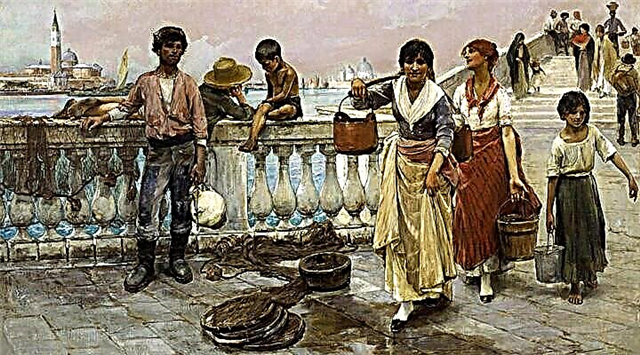The storyteller read this story in an old manuscript.
In the Italian city of Ferrara, around the sixteenth century, two young men lived: Fabius and Mucius. Peers and close relatives, they belonged to ancient and rich surnames and never parted. Mucius was a musician, and Fabius was an artist. Having the same tastes and inclinations, outwardly they were not similar. Fabius was tall, blue-eyed and fair-haired, with a bright friendly smile on his lips. Mucius had a dark, serious and unsmiling face, black hair and brown eyes. Both friends were beautiful and liked by the ladies.
At the same time, the beautiful Valeria, a modest, meek and shy girl, the daughter of a noble but not rich widow, lived in Ferrara. Valeria left the house only in the church and sometimes appeared on city festivities.
Oh, how happy that young man will be for whom this still untouched, untouched and virgin flower will finally bloom.
Fabius and Mucius saw Valeria at the "magnificent public festivities" and passionately fell in love with her. They decided to get closer to the girl and give her a choice. The loser will submit and leave.
Good fame allowed friends to "enter the inaccessible house of a widow." They took care of Valeria for a long time, and then wrote a letter to her asking them to give their hand and heart to one of them. The girl asked her mother for advice, and the widow advised her to choose Fabius - she noticed that her daughter was not so shy in front of him.
Fabius “found out about his happiness”, and Mutsius kept his word, urgently sold most of the property and went on a long journey to the East.
The newlyweds settled in the beautiful villa Fabia, surrounded by a shady garden. Four years, the couple lived happily. Valeria's virtues were revealed “in a new captivating light”, and Mutsius “became a significant painter”. Only one thing overshadowed the happiness of the couple: they had no children.
By the end of the fourth year, Valeria's mother died. She grieved for a long time, but gradually life went back on track.
A year later, Muzio suddenly returned to Ferrara. Fabius accidentally met a friend on the street, was delighted and invited him to settle in the pavilion in his villa. Mucius moved there with his servant, a “servilely feigned” Malay, whose tongue was cut out.
Mucius brought with him dozens of chests with various jewels collected during his travels. One of them - a magnificent pearl necklace - Mutsio put on Valeria’s neck: “it seemed to her heavy and endowed with some strange warmth ... it clung to her skin”.
Mucius told about his wanderings in Persia, Arabia, India, to the borders of China and Tibet. Mucius's facial features did not change, but his expression became different - focused and important. His voice became deaf, and the movements of his hands and body “lost the swagger” characteristic of Italians. In the behavior of Mucius "something alien and unprecedented was manifested."
At dinner, Mutsio treated his friends with golden and thick Shiraz wine.
Taste it was not like European wines; it was very sweet and spicy, and, drunk slowly, in small sips, aroused in all the members a sensation of pleasant nap.
Pouring wine into Valeria's bowl, he whispered something and shook his fingers.
Mucius then played several mournful folk songs on the Indian violin, and then a passionate melody-song that he heard on the island of Ceylon, where it is called the song of happy, satisfied love.
Valeria fell asleep only in the morning. She dreamed that she entered a richly decorated room with alabaster columns. The curtain at the opposite end of the room leaned back and Mucius entered.He laughed and hugged Valeria, his dry lips burned her whole, and she fell on a luxurious carpet.
Valeria hardly woke up, woke her husband and said that she had a nightmare. At that moment, a song of triumphant love sounded from the side of the pavilion. Valeria never told her husband what her dream was about.
In the morning, Muzio went out to breakfast. He seemed contented, cheerful, and told that he dreamed that he was in a rich room decorated with alabaster columns alone with the woman whom he had once loved. The woman was so beautiful that he all fired up with his former love. Waking up, Mutius played the song of triumphant love on the violin. According to the description of Mutsia, the frightened Valeria recognized the room from her dream.
In the afternoon, Fabius tried to continue work on the portrait of his wife, which he had begun even before the return of Mucius, but could not find on Valery's pale and tired face that pure, holy expression that he liked so much. Fabius already repented that he had invited Mucius to stay at his place. He was confused not only by a changed friend, but also by his dumb servant. According to Mucius, the cut off tongue was a sacrifice, bringing which the Malay gained great strength.
Both spouses spent this day sadly. It seemed that something dark hung over their heads ... but what it was - they could not name.
Mutius, calm and contented, returned late in the evening. He again treated the spouses with Shiraz wine. Valeria refused, and Mutsius, as if to himself, said: "Now it’s no longer necessary."
At night, Fabius woke up and found that Valeria was not in the bedroom, and then he saw his wife in a night gown entering the room from the garden. She made her way to bed to the touch "with her eyes closed, with an expression of secret horror on her motionless face." Fabius rushed into the garden and saw on the track “traces of a double pair of legs” - barefoot and shod. Suddenly the sounds of a witching song rang out - it was Mucius again playing.
In the morning, Valeria went to her spiritual father in a neighboring monastery. In a confession, she told everything. The confessor forgave her an involuntary sin. Suspecting "demonic spells," the stately monk, together with Valeria, went to her villa and advised Fabius to remove the guest from the house if possible. The confessor believed that Mucius engaged in black magic. Fabius decided to follow his advice.
Mucius did not return for dinner, and Fabius had to postpone the conversation in the morning. At night, Fabius saw Valeria get out of bed and go into the garden, stretching out her arms and looking in front of her with lifeless eyes. He ran out the other door and quickly locked the one Valeria was walking towards. Rushing to the pavilion, Fabius saw Muzio. With arms outstretched, with dull eyes, he walked towards Valeria, who had given up attempts to open the door and was already leaving through a high window. Enraged, Fabius stabbed Mucius with a dagger in the side. Drenched in blood, Mutsi hid in the pavilion, and Valeria fell to the ground.
Carrying Valery to the bedroom, where the woman fell sound asleep, Fabius went to the pavilion to find out if Mutsius was still alive. He saw a dead friend and Malay, who performed some kind of magic ritual over the corpse.
Urom the butler informed Fabius that he had received a note from the Malay. He wrote that the signor fell ill, wants to move to the city and asks to give people to help him with packing, horses and a few escorts. The awakened Valeria was glad that Mutsius was leaving, and ordered to throw the necklace he had gifted into the well. To Fabius, it seemed that the pearls on the necklace had faded.
Fabius was sure that he had seen Mucius dead at night. He decided to look again and entered the pavilion through the back door. Fabius saw that the Malay put on road clothes on the body of Mucius and was trying to revive him using the same ritual.
The dead man's eyelids fluttered, peaked unevenly, and from under them appeared little dummies, like lead. Proud triumph and joy, joy almost evil, brightened the face of the Malay.
Frightened, Fabius rushed to run.
A few hours later, the Malay led the lifeless Mucius out of the pavilion, put him in front of him on a horse, and they, accompanied by a caravan of horses loaded with property, left the villa. At the last moment Fabius thought that Mucius looked at him with his dead eyes.
Spouses have healed a former life. Her usual expression of purity returned to Valeria's face. Once Valeria, against her will, played the song of triumphant love on the organ, and at the same time for the first time "felt the thrill of a new, nascent life."


 Communication skill
Communication skill








